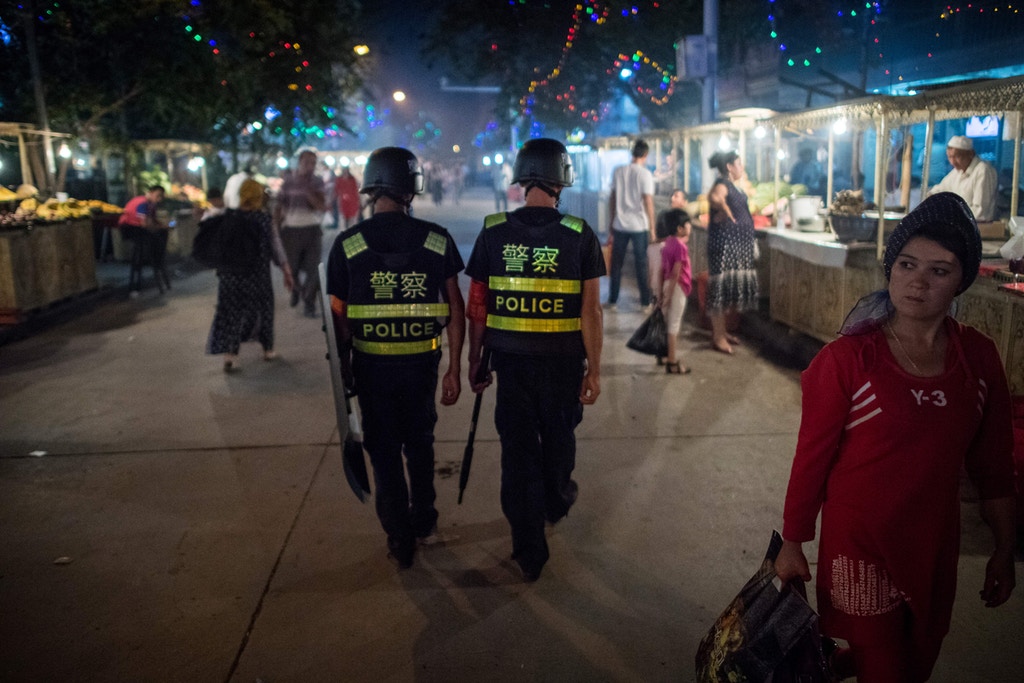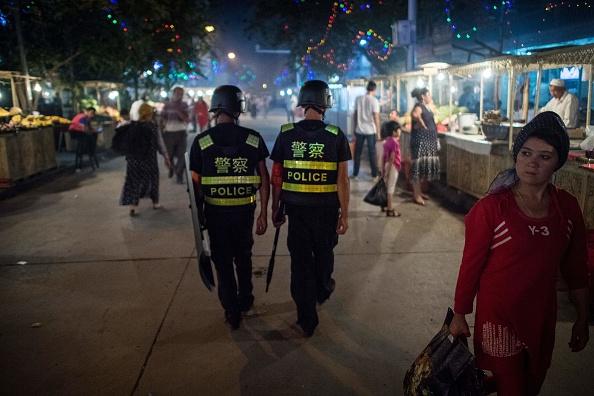China Is Violating Uighurs’ Human Rights. The United States Must Act.

Foreign Policy, 28 November 2018
 By Michael H. Fuchs, Daniel Benaim, Blaine Johnson The Chinese Communist Party is carrying out a methodicalcampaign of oppression in an apparent attempt to extinguish the religion and ethnicity of the Uighur people. Residing mostly in what the Chinese state calls its Xinjiang Uighur Autonomous Region, Uighurs today are not free in the most fundamental sense of the word—not to travel, not to practice their faith, not to speak with their relatives, not to name their children. Not even submission to discriminatory government regulations and coercion keeps their families safe. And the world barely seems to notice.
By Michael H. Fuchs, Daniel Benaim, Blaine Johnson The Chinese Communist Party is carrying out a methodicalcampaign of oppression in an apparent attempt to extinguish the religion and ethnicity of the Uighur people. Residing mostly in what the Chinese state calls its Xinjiang Uighur Autonomous Region, Uighurs today are not free in the most fundamental sense of the word—not to travel, not to practice their faith, not to speak with their relatives, not to name their children. Not even submission to discriminatory government regulations and coercion keeps their families safe. And the world barely seems to notice.
While the United States may not be able to achieve everything it might want when it comes to China, it must call the world’s attention to Xinjiang, pressure Beijing, attempt to ease the plight of imprisoned Uighurs and other minority groups, and deter other countries that might seek to emulate Beijing’s campaign of oppression.
The human engineering experiment the Chinese government is undertaking resembles the policies of the most repressive colonial regimes and is as Orwellian as China’s Cultural Revolution. Around 1 million Uighurs—more than the population of San Francisco—are locked up in so-called re-education camps. There, “Thousands of guards equipped with tear gas, Tasers, stun guns, and spiked clubs keep tight control over ‘students’”—who are supposed to “break [the Uighurs’] lineage, break their roots, break their connections, and break their origins” to “build new, better Chinese citizens.” Torture and beatings are reportedly regular occurrences.
Detailed reports monitoring Chinese government contracts and satellite images of Xinjiang camp construction, in addition to more than 1,000 testimonies from family members of interned Uighurs and Kazakhs, reveal a terrifying picture. Many Uighurs who remain in their homes live under the surveillance of government-assigned Han Chinese “relatives” in forced homestays. The government has mobilized more than 1 million uninvited guests “to aid the military and police in their campaign by occupying the homes of the region’s Uighurs and other Muslim minorities, and undertaking programs of indoctrination and surveillance.”
It is well-known that the Chinese government violates its people’s human rights. But what is happening in Xinjiang—and also in Tibet, where some of the tactics used in Xinjiang were first employed—is even more dire. The Communist Party views the very existence of ethnic and religious minority groups inside China as a threat to be extinguished with a pseudoscientific policy of psychological and physical aggression.
This is not just about human rights or China. It’s about how the United States and others respond to a growing trend of authoritarian impunity that is gaining ground worldwide. The striking silence of most of the Islamic world—with many countries either beholden, fearful, or eager to curry favor with China—has greased Beijing’s path to mass repression of their fellow Muslims.
Advocating for human rights inside a state as resistant to outside pressure and geopolitically important as China can feel futile. But for reasons simultaneously moral and strategic, the United States and the world can and should do something.
Despite the United States’ terrible past treatment of Native Americans and other minorities, respecting human rights should be part of what sets America apart from autocracies such as China. That distinction represents a moral and diplomatic comparative advantage that the current administration has ignored if not undermined outright. True to form, the Trump White House has largely ignored the crisis in Xinjiang.
Not only does President Donald Trump disregard human rights; he outright embraces the illiberal tactics of Xi Jinping and other strongmen. Trump has likewise used the rationale of counterterrorism to justify persecution of a large group of people as inherently dangerous based on their identity: He proposed banning all Muslims from entering the United States during the 2016 campaign and raised the specter of gang violence to foment fear of Mexicans and stir up opposition to asylum-seekers from Central America.
The atrocities in the camps may occur far away, but what happens in China is not staying in China. The Chinese government has sought out Uighurs around the world for extradition, intimidated and collectively punished Xinjiang-based families as a method of threatening overseas Uighurs, including extorting them to come back to China and submit to internment. Beijing even abducted the head of Interpol (a Chinese national)—allegedly for failing to execute this campaign with sufficient fervor.
Tibet and Xinjiang have become laboratories for high-tech totalitarianism, deploying large-scale use of networked surveillance cameras, facial recognition, smartphone scanners, and big data to monitor and control citizens with superhuman efficiency. China is building a model it can export. Sales to Malaysia, Zimbabwe, Venezuela, and Arab countries are just the beginning.
China’s repression of Uighurs beyond its borders demonstrates how brazen authoritarian countries have become in attacking would-be critics overseas and how dismissive they are of other countries’ sovereign rights to protect their populations in their own territory. Dramatic murders of dissidents overseas by Saudi Arabia, Russia, and North Korea have captured headlines. Given the White House’s toothless, half-hearted condemnation, they surely won’t be the last.
The world cannot afford for a Xinjiang model to become normalized. The government of Myanmar used a campaign of violence to drive hundreds of thousands of Rohingya Muslims out of the country. If countries come to see Chinese state oppression in Xinjiang as a success, it raises the question of how many other strongmen worldwide with restive border regions and ostracized minority groups will brutally follow suit.
Washington’s ability to influence Beijing’s actions within China is limited. Moreover, there are other issues of great consequence in U.S.-Chinese relations to consider. And yes, never has a U.S. president been worse-positioned to make the moral case. But there is still much the United States and the world can do.
Sens. Robert Menendez (D-N.J.) and Marco Rubio (R-Fla.) have introduced bipartisan legislation requiring the State Department and intelligence community to report on what the Chinese government is doing in Xinjiang. This is a good start, but with the Trump administration unlikely to act, Congress will need to take the lead on a more robust policy.
The first thing the United States should do is to protect Uighurs living on U.S. soil. Sweden and Germany have reportedly halted any extraditions of Uighur asylees back to China, and the U.S. government should follow suit. The United States should offer temporary protected status to endangered Uighurs in America and encourage other countries to do the same. As called for in the Uyghur Human Rights Policy Act, the FBI and other law enforcement agencies must be empowered to hold accountable Chinese officials who intimidate overseas Uighurs, particularly inside the United States.
Congress should push the Trump administration to use the Global Magnitsky Act to sanction individual officials responsible for developing and implementing China’s cyber-authoritarian toolkit in Tibet and Xinjiang. This law, designed as a tool to punish gross human rights abuses and corruption, was used to sanction Saudi officials after the killing of journalist Jamal Khashoggi. This will show China that the United States will hold high-level officials responsible for these human rights violations.
The U.S. government should collect, declassify, and publicize intelligence about the camps and other extrajudicial abuse of Uighurs, to share credible information with the rest of the world. U.S. diplomats can ensure that this kind of information is disseminated widely—especially in Muslim-majority countries in Asia, where it would contribute to public pressure on governments in Pakistan, Malaysia, and Indonesia to at least broach the issue with China, raising the diplomatic price of repression. While these countries may see the costs of criticizing China as too great, public pressure could change their calculus. And the more that countries which aren’t normally critical of China raise the issue, the more Beijing may register this as a genuine problem.
Members of Congress should openly call for international inspectors and U.N. officials to be admitted to the prison facilities in Xinjiang. Since Beijing denies the reports of abuses in the Xinjiang camps—a recent pivot from denying their existence outright—a call for inspectors would place the onus on Beijing to explain to the world what it is doing. The United States should also sign on to efforts such as the request of 15 Western ambassadors (from Australia, Belgium, Canada, Denmark, Estonia, the European Union, Finland, France, Germany, Ireland, the Netherlands, Norway, Sweden, Switzerland, and the United Kingdom) for a meeting with Xinjiang region Communist Party Secretary Chen Quanguo, which the Trump administration did not join.
Congress could also apply the Magnitsky Act to the Chinese companies—such as Hikvision, Dahua Technology, China Electronics Technology Group Corporation, and Huawei—that supply the Chinese government with tools of high-tech oppression. Through hearings, Congress can pressure U.S. businesses, such as Intel and Nvidia, that have enabled Chinese repression in Xinjiang by investing in or providing technology to these Chinese companies. Companies that have exported the tools of mass surveillance to China, or those that do business in Xinjiang should be asked to appear before Congress and explain why they continue to sell such technology to China.
The U.S. government may not be able to solve all the world’s problems. But the way Washington responds to the most difficult challenges says a lot about the United States as a country. America cannot ignore what China is doing in Xinjiang.
China Is Violating Uighurs’ Human Rights. The United States Must Act.

